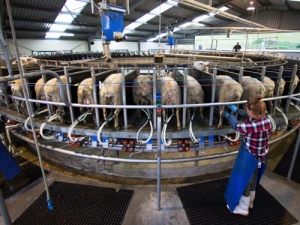Maui Milk targets 500 litre ewe production by 2030 as leadership transitions
Sheep milk processor Maui Milk is on track to record average ewe production of 500 litres by 2030, says outgoing chief executive Greg Hamill.
 The pure East Friesian embryos, which have been frozen in time since the late 1990s, will be an essential part of a new genetic improvement programme.
The pure East Friesian embryos, which have been frozen in time since the late 1990s, will be an essential part of a new genetic improvement programme.
Rising interest in dairy sheep is about to be matched by the availability of milking ewes thanks to 15-year-old frozen embryos.
The pure East Friesian embryos, which have been frozen in time since the late 1990s, will be an essential part of a new genetic improvement programme. Dr Jock Allison, the original importer of the breed, retained the unique gene pool.
Maui Milk general manager Peter Gatley and Jake Chardon attended a dairy sheep conference at Massey in February this year and found themselves in conversation with Allison.
They were surprised to discover that 1700 East Friesian embryos still existed in their pure form, untouched in liquid nitrogen for more than 15 years. A deal was done on the spot, and within weeks, the entire stock was surgically implanted in recipient ewes at Awapai in Hawkes Bay, owned by Simon Beamish, one of the Rissington Breedline founding partners.
Impetus for the initiative has come from the creation of Maui Milk, a joint venture partnership between New Zealand farming and Chinese marketing interests.
Mated over maternal breeds such as Poll Dorset, Coopworth or Highlander, the result is known as an 'F1', or first cross, a hybrid with milking ability, constitution and hybrid vigour.
Similar ewes have formed the basis of the flock of 3000 milked by the Waituhi Kuratau Trust, the Maui Milk joint venture partner farming west of Lake Taupo.
The females resulting from the embryo programme will be milked in 2016, providing valuable data on the comparative performance of the pure strain under local conditions, and the top performers will be selected as embryo donors. Rams from various bloodlines will be retained for progeny testing, and the remainder will generate up to 10,000 crossbred milking ewes in their first year.
Allison is delighted to see the potential of the gene pool being realised. "I didn't want to see those embryos go out 50 or 100 at a time because this would dissipate the value. There's a critical mass of genetic material there that these guys can work with. I've no doubt they'll create something special".
This initiative will not only drive genetic gain, but also carry out farm system development to provide a template for Kiwi farmers to replicate. It is known as Southern Cross Dairy Sheep Technology.
With the current situation in the European farm machinery market being described as difficult at best, it’s perhaps no surprise that the upcoming AgriSIMA 2026 agricultural machinery exhibition, scheduled for February 2026 at Paris-Nord Villepinte, has been cancelled.
The Meat Industry Association of New Zealand (MIA) has launched the first in-market activation of the refreshed Taste Pure Nature country-of-origin brand with an exclusive pop-up restaurant experience in Shanghai.
Jayna Wadsworth, daughter of the late New Zealand wicketkeeper Ken Wadsworth, has launched an auction of cricket memorabilia to raise funds for I Am Hope's youth mental health work.
As we move into the 2025/26 growing season, the Tractor and Machinery Association (TAMA) reports that the third quarter results for the year to date is showing that the stagnated tractor market of the last 18 months is showing signs of recovery.
DairyNZ chair Tracy Brown is urging dairy farmers to participate in the 2026 Levy vote, to be held early next year.
Beef + Lamb New Zealand (B+LNZ) is calling for nominations for director roles in the Eastern North Island and Southern South Island electoral districts.